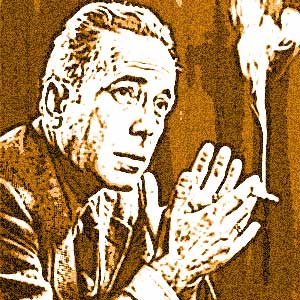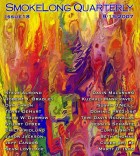At the beginning of this story, we find Olive’s boss molding hamburgers perfect enough to be permanent, “something to fire in a kiln and set out for display.” By the end, the boss’s daughters are running around in their mother’s lingerie, like “six-year-old in heat.” Talk about the evolution of this piece, this party.
What I like about parties (in fiction, if not in life) is how they magnify much of the surreal striving that occurs whenever people collide: the desire to fit in, to be witty, to impress each other, to feel less alone. But this party, like many, is also highly staged, often painfully superficial, and I suppose that is one of the things I’m interested in exploring. If there is an “evolution” in the party, it is hopefully towards some exposure of the underlying disjuncture between what people want from each other and what they in fact do. In that gap lie all kinds of wonderful and sad absurdities. Though the party-goers take the girls at the end of the story no more seriously than anything else, calling them, lightly, “six-year-olds in heat,” the girls nonetheless suggest something of Olive’s—of everyone’s—confused desolation
I come to the end of this story and wonder: what does it all mean? In your opinion, do stories always have to mean something, or can they just be?
For me—as a reader, as a writer—stories do have to mean something, though the very best stories often mean several (sometimes contradictory) things at once and different things to different people. By “meaning,” I’m simply talking about the story’s effects on the reader’s imagination. Readers are meaning makers, I think: they connect words and paragraphs into patterns, whatever the writer intends for her work. And when writers fail to recognize this impulse in readers, when they fail to respond to this impulse and interact with it, a fundamental breakdown in communication occurs. It seems irresponsible to me, somehow, to simply ignore the reader’s hunger for and expectation of meaning, though it is equally irresponsible to blindly fulfill those expectations. My favorite writers recognize and challenge the reader’s expectations for meaning in every breath. This is what makes stories surprising, delightful, and haunting. Similarly, when readers stop looking for meaning in stories—not morals or even the writer’s intentions, but possible connections between events and words and characters—they limit their own access to a story’s potential power.
In the end, I’m glad you ask, “What does it all mean?” at the end of this story. The fun part for me is hearing how you—and other readers—answer that question.
Olive is very remote, and yet without her, I can’t imagine this narrative existing in anything close to this form. How important is her character and perspective to this story? Can you imagine this party from the boss’s point of view, or any of the other party goers?
In relationship to your previous question, I think that Olive herself is preoccupied with whether and how meaning accrues. She works at her bland office job, socializing with her co-workers whom she doesn’t always enjoy, but who are “available.” For me, much of the story turns on Olive’s craving for meaningful human connection, and showcases Olive’s disappointment in the unreality of things, the meaninglessness. Playing games, flirtation, the death of the squirrel—all are equally strange and equally empty to her. I can imagine this party from other characters’ points of view, but those would be different stories, of course. It is Olive’s remoteness that makes the events at this party seem so alien and arbitrary
You have an MFA in fiction from Washington University. With whom did you study? Who has influenced you the most?
It’s nice to have the chance to sing the praises of the people I’m fond of. At Washington University, I had the pleasure of studying intensively with two teachers: Marshall Klimasewiski and Kellie Wells. They are both remarkable writers, stalking their separate fascinations in precise and often startling prose. I felt particularly lucky to work with such good writers who were also unusually energetic and devoted teachers; it is obvious, though not always truly appreciated, that writing and teaching are separate skills. Also, because Wash U has a very good visiting writers program, I had the opportunity to work more briefly with people whose work I admire a great deal, such as Peter Ho Davies and Joy Williams
In terms of influences—aside from the writers of books I’ve loved and returned to again and again—the writers who meant the most to me during the MFA program were my peers. I felt challenged and encouraged by a few exceptional people, who have now gone on to publish and teach (and do whatever writers do to keep writing). I’m sure I did not need an MFA program to find such a worthy group of writers with whom to struggle, compete, and commiserate—but there was nothing about the MFA program more valuable to me than that
Since this is my first issue with SLQ, I thought it’d be appropriate to discuss firsts. Writing firsts. First time you called yourself a writer, first publication, first check. Those sorts of things. So, dish. What is your most memorable writing first?
I suppose I’m one of those people who has been writing (generally badly) since I was arranging the furniture in my dollhouse, and perhaps because of this, calling myself a writer still feels awkward, even a little shameful—like admitting I play with dolls or toys, or worse, asking to be respected for taking my dolls so seriously. For this reason, I first started calling myself a writer not when I started writing, nor when I started feeling that writing well was one of the most important things I could think of doing, but when I needed things to keep writing: money, residencies, publications, time. Even now, when asked point blank about what I do, I shy away from the noun and go with the verb, which has always seemed more accurate and defensible: I write. And though my first acceptance for publication resulted in walking through a St. Louis park in an absolute daze of pleasure (I think I grinned helplessly at a Chinese couple playing Frisbee and scared them away), I have come to rely on other “firsts” to keep me returning to my stories. There are technical accomplishments that have been immensely important to me—the first scene I wrote with more than five characters, the first death I pulled off—but even these are not quite so important as a certain feeling of encounter that happens for me, sometimes, inside stories. Examples? The first time a character disappointed or aroused me; the first time I was really unnerved by the way a scene turned out; the first time I came to the end of a story and couldn’t stop writing because it wasn’t the end. It is the pursuit of these sorts of firsts that keeps me returning to my desk, despite every other reluctance.



 The core workshop of SmokeLong Fitness is all in writing, so you can take part from anywhere at anytime. We are excited about creating a supportive, consistent and structured environment for flash writers to work on their craft in a community. We are thrilled and proud to say that our workshop participants have won, placed, or been listed in every major flash competition. Community works.
The core workshop of SmokeLong Fitness is all in writing, so you can take part from anywhere at anytime. We are excited about creating a supportive, consistent and structured environment for flash writers to work on their craft in a community. We are thrilled and proud to say that our workshop participants have won, placed, or been listed in every major flash competition. Community works.